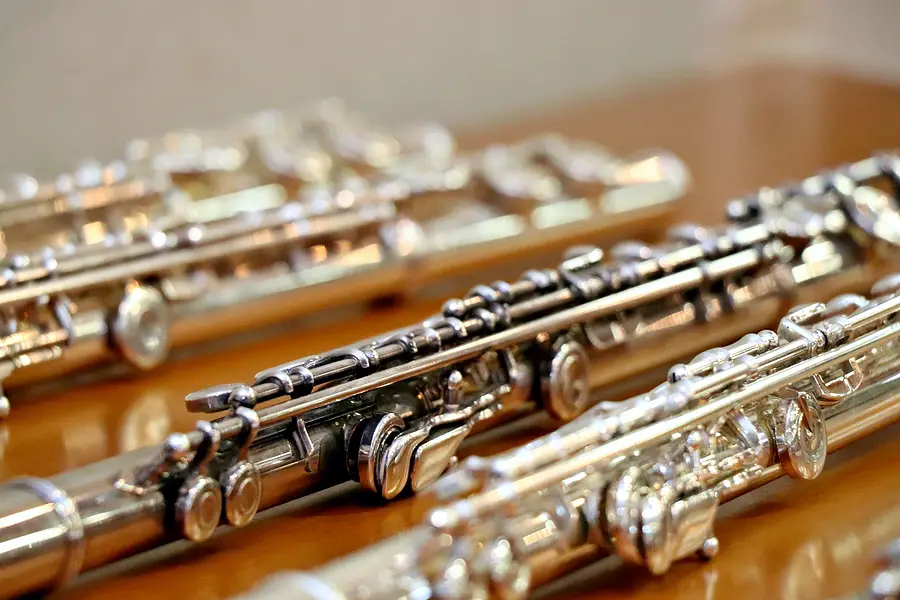Whether you’re just starting to learn how to play the flute or are a lead flautist in your local orchestra, the answer of how and with what to clean your flute isn’t always as abundantly obvious as you may think. While some individuals swear by silver polish, others may recommend alcohol, and some may recommend not cleaning it at all. The key is to figure out what cleaning compounds are best for your flute, and why it is so important to know definitively which supplies are harmful as well.
To sum it all up, cleaning your flute is typically best done with anti-tarnish silver polish and rubbing alcohol or hydrogen peroxide. You can also use soap and water but in small amounts so as to not destroy the pads or the headjoint cork either. While Windex isn’t necessarily harmful, it also isn’t recommended. The main things to avoid using include your dishwasher, abrasive chemicals, and any kinds of oils or polishes that will make your flute sticky or will lead to rust or pad damage.
For an in-depth breakdown of why each product is best, how to apply it, and why these additional products may be harmful for your flute, let’s dive into the various intricate particulars of flute cleaning below.
Can You Clean a Flute With Windex?
 One of the biggest questions that flautists often ask when looking for cheap ways to clean their flute is whether or not Windex can be an effective option. With the versatility of Windex as well as the fact that it is a cost-effective non-abrasive cleaning product, it’s obvious why many would turn to this option first for a flute cleaning solution.
One of the biggest questions that flautists often ask when looking for cheap ways to clean their flute is whether or not Windex can be an effective option. With the versatility of Windex as well as the fact that it is a cost-effective non-abrasive cleaning product, it’s obvious why many would turn to this option first for a flute cleaning solution.
The answer to this question is yes, you absolutely can use Windex to clean your flute but should definitely avoid your headjoint cork as well as your pads so as to not damage them when doing so. However, there are better solutions for cleaning your instrument.
In order to properly use Windex to clean your flute, first apply the Windex to a microfiber cloth and have another microfiber cloth set aside. Next, rub the Windex cloth in a circular motion on the flute being sure to avoid damaging the pads and the cork. You can disassemble the body, foot, and head joints to make this easier. Lastly, use the other cloth set aside to rub down the flute in a circular motion once more in order to remove any potential streaks or wet areas. If you want to also clean the inside of your flute body, use a cleaning rod and a cloth with the Windex on it to clean inside the flute and do so without damaging the flute internally.
Can you use rubbing alcohol to clean a flute?
 Another option that is more effective for disinfecting your flute specifically is rubbing alcohol. Rubbing alcohol is perfect for cleaning your headjoint and around your pads carefully in order to disinfect them. The rubbing alcohol solution is a great way to avoid using bleach but to still disinfect your mouthpiece thoroughly.
Another option that is more effective for disinfecting your flute specifically is rubbing alcohol. Rubbing alcohol is perfect for cleaning your headjoint and around your pads carefully in order to disinfect them. The rubbing alcohol solution is a great way to avoid using bleach but to still disinfect your mouthpiece thoroughly.
According to Volkweins Music, “Most viruses cannot live on hard surfaces for a prolonged period of time. Some die simply with exposure to air. However, certain groups are quite hardy. Therefore, musicians must be concerned with instrument hygiene. Users of school owned and rented musical equipment may be more susceptible to infections from instruments that are not cleaned and maintained properly.”
With this being said, before and after every use it is best to wipe down your mouthpiece with a cotton swab or Q-tip covered in rubbing alcohol. You will also want to let it air dry and avoid touching your instrument with unwashed hands as well.
Can you wash a flute with soap and water?
Another commonly asked question when it comes to cleaning solutions for your flute is whether or not you can simply use soap and water. While the answer is still yes, the stipulation that must be made is ‘with moderation.’ If your goal is to wash your flute in the sink like a piece of silverware, you are sorely mistaken. However, if you use Dawn dish detergent (a non-abrasive solution) and water carefully to clean the inside and outside of your flute without getting water on the cork or pads, you should be just fine.
While soap and water may be acceptable, cleaning your flute in the sink or, even worse, the dishwasher is bound to lead to damage to your instrument. What is important to remember is that your flute is an intricate instrument and not just a piece of metal pipe for you to handle any way you please.
With this being said, use one microfiber cloth to wipe down your flute with your soap and water, then another cloth to rinse off the soap, and lastly, use your final cloth to dry it all off. It is highly important that you also dry your flute as water in various flute crevices can lead to rust if unchecked long enough.
Can you clean a flute with bleach?
One of the most common questions flautists ask when it comes to cleaning supplies is why you can’t simply use bleach or bleach wipes to clean your flute as it cleans and disinfects all at once. The answer to this is a resounding “No” because of the abrasive nature of bleach and how this interacts not only with your silver but with your flute’s finish as well.
All in all, however, it is less about the damage it causes to the silver itself but to the finish on your flute rather. According to Quora, “Bleach is a powerful oxidising agent but the damage to silver is on the surface only and can be removed with commercial silver polish. The action of bleach on gold is more dramatic and will dissolve the gold over time to create severe erosion, such as the thinning of ring bands.”
With this being said, if you have a gold flute, you have a far more likely chance of damaging your flute irreparably with the use of bleach. However, with silver flutes, the main reason not to use bleach is because the finish on any flute is not strong enough to handle the corrosive nature of bleach and, once the finish is gone, your flute will no longer be shiny and will also tarnish, scratch, and dull far more easily.
Can you use vinegar to clean your flute?
Considering the fact that this is a pretty common household cleaner as well as a common cleaner for drum cymbals and other metal instruments and gear, it’s no wonder why many people wonder whether or not vinegar is a viable cleaning solution for flutes.
Unfortunately, just as the bleach is corrosive and can damage the finish on your silver flute, vinegar breaks down finishes on instruments as well which can dull and even potentially damage the exterior of your flute leading to leaks that can affect the sound of your flute indefinitely.
If your reason for using vinegar is to remove tarnish, we recommend using an anti-tarnish silver polish instead as it is far more effective and also far less likely to damage your silver finish likewise.
Can you clean a flute with hydrogen peroxide?

Just as people often ask whether or not you can clean a flute using rubbing alcohol, the same question arises when it comes to hydrogen peroxide. Fortunately, hydrogen peroxide and rubbing alcohol are pretty much interchangeable when it comes to flute cleaning and disinfecting although some argue that rubbing alcohol is a tad bit better.
All in all, to use hydrogen peroxide, you will want to have cotton swabs and a microfiber cloth in order to rub down the three pieces of your flute without actually damaging them in the process. You can also use the microfiber cloth to wipe off any excess as hydrogen peroxide does not dry as rapidly as rubbing alcohol would.
Just make sure to not use the hydrogen peroxide on the mouthpiece, pads, or corks as they can be damaged.
So, what cleaners can I use on my flute?
 We’ve gone through many of the common cleaners here but the best solution is actually a good anti-tarnish silver polish for the outside of your flute and then a light application of rubbing alcohol for the inside.
We’ve gone through many of the common cleaners here but the best solution is actually a good anti-tarnish silver polish for the outside of your flute and then a light application of rubbing alcohol for the inside.
We recommend MusicNomad Silver Polish and you can read more or buy it on Amazon but you can also pick up Wright’s Silver Cleaner from Walmart.
To clean with the polish, you’ll want two microfiber cloths. With the first, you’ll apply a couple of drops to the first microfiber cloth and then rub in a circular motion on the flute, avoiding the pads and cork. You can disassemble the body, foot, and head joints to make this easier. Then, use the other cloth to rub down the flute once more to remove any streaks or wet area.
Then, using a cleaning rod, flute swab, or flute wand, first wipe out the interior of your flute and then apply a little rubbing alcohol to remove more of the bacteria and gunk.
While rubbing alcohol, hydrogen peroxide, soap and water, or Windex can be used for cleaning the exterior of your flute, anti-tarnish silver polish does the best job of keeping your instrument tarnish-free and shiny.
What Cleaning Products Should You not use on Your Flute?
Just as it is essential for you to know what cleaning products are best for your flute, you must also know the ones to avoid. By doing so, you can ensure that your flute will not be damaged during the cleaning process and will continue to function properly for years.
With this being said, the main cleaning products to avoid are abrasive products such as comet, scouring pads, brillo pads, and degreasers. You will also want to avoid oils as they can actually affect your silver flute and lead to tarnishing over time. Lastly, be careful using liquid products that aren’t handled appropriately as you can damage your flute’s cork or pads in the process.
Once again, as stated above, one of the ultimate mistakes of the flute cleaning process is to put your flute in the dishwasher. The main thing to keep in mind regarding this is that flutes are absolutely not meant to be placed in the dishwasher as it will irreparably damage your pads which are expensive to replace.
In conclusion
In the end, no matter what level you are when it comes to playing the flute, every flautist must first recognize how to maintain their flute before they can truly respect it. While there are many ways to clean your flute, the main thing to take into account is that, with a bit of silver polish and one out of the many non-abrasive household cleaners on the market, you are sure to extend the lifespan of your flute and save yourself tons of money in the process.


